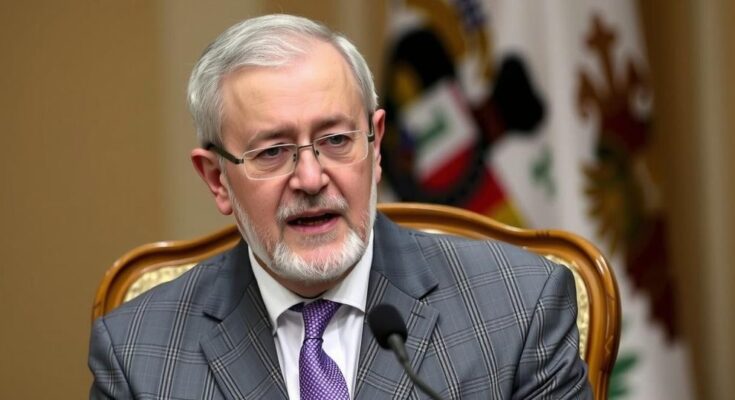Ahmed al-Sharaa, Syria’s de facto leader, announced that the nation’s political transition to democracy may take four years, necessitating a new constitution. He highlighted the importance of foreign relations, particularly with Iran and Russia, and expressed hope for the lifting of sanctions under the new US administration.
Syria’s de facto leader, Ahmed al-Sharaa, has indicated that the political transition towards democracy in the country could take as long as four years. In a recent interview with Saudi state-owned Al Arabiya, he emphasized the necessity of drafting a new constitution before elections can occur, a process he estimates may take two to three years. Sharaa’s remarks follow the ousting of the former leader Bashar al-Assad by the Islamist rebel group Hayat Tahrir al-Sham (HTS). An interim government has been established to guide the nation until March 1, amid calls for inclusive political processes from various international actors, including the United Nations and diplomats from the US, Turkey, and the EU.
Further discussing foreign relations, Sharaa underscored the importance of maintaining ties with Iran and Russia, despite the recent regime change. He expressed hope that the incoming US administration would consider lifting sanctions imposed on Syria under Assad’s regime. Sharaa also highlighted the need for local Kurdish-led forces, known for their significant role in combating ISIS, to integrate into the national military.
In view of the geopolitical landscape, Sharaa articulated the necessity for Syria’s sovereignty in diplomatic relations, stating, “Syria cannot continue without relations with an important regional country like Iran.” Moreover, he acknowledged Saudi Arabia’s potential role in Syria’s future economic recovery, citing opportunities for regional investment.
Sharaa’s vision for Syria appears focused on establishing a stable and inclusive governance framework while navigating the complexities of international relations and local dynamics. Moreover, he advocates for a comprehensive approach to integrating various armed groups within the national defense structure, promoting unity and stability in the region.
The statement by Ahmed al-Sharaa comes in the context of Syria’s ongoing civil war, which has ravaged the country since 2011. The recent power shift following the removal of Bashar al-Assad introduces a pivotal moment for Syria to redefine its political landscape. The significance of drafting a new constitution and subsequent elections is underscored by United Nations Security Council Resolution 2254, which calls for a political solution to the Syrian conflict. International stakeholders have expressed a vested interest in ensuring that any future governance framework is inclusive and respectful of the diverse populations within Syria. Additionally, Sharaa’s remarks on relations with regional powers, particularly Iran, Russia, and Saudi Arabia, highlight the geopolitical intricacies that will influence Syria’s recovery and governance.
In conclusion, the timeline for Syria’s transition to democracy, as outlined by de facto leader Ahmed al-Sharaa, could extend over four years, primarily due to constitutional reforms. His remarks indicate a commitment to an inclusive political dialogue and the integration of various groups into a unified national framework. The significance of foreign relations and lifting sanctions further complicates but also potentially aids in Syria’s future stability and recovery.
Original Source: www.abc.net.au




